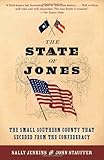
In 1863, after surviving the devastating Battle of Corinth, Newton Knight, a poor farmer from Mississippi, deserted the Confederate Army and began a guerrilla battle against the Confederacy. For two years he and other residents of Jones County engaged in an insurrection that would have repercussions far beyond the s cope of the Civil War. In this dramatic account of an almost forgotten chapter of American history, Sally Jenkins and John Stauffer upend the traditional myth of the Confederacy as a heroic and unified Lost Cause, revealing the fractures within Civil-War era Southern society. No man better exemplified these complexities than Newton Knight, a pro-Union sympathizer in the deep South who refused to fight a rich man’s war for slavery and cotton.Amazon
Sally Jenkins and John Stauffer on State of Jones

 Newton Knight is the most famous Civil War hero you’ve never heard of, because according to Mississippi legend he betrayed not only the Confederacy but his race as well. In 1863 Knight, a poor farmer from Jones County Mississippi, deserted the Confederate Armyâ€"and began fighting for the Unionâ€"after the battle of Vi cksburg. It was rumored he even started a separate Unionist government, The Free State of Jones, and for two years he battled the Confederacy with a vengeance that solidified his legend. During his life Knight was hardly regarded as a proper soldier by either side, and after his death his Mississippi backwoods grave went unstrewn with flowers. Many southerners would have preferred to spit on it, and most northerners never recognized that such loyalty to the United States could exist in Dixie. But in truth, this lost patriot was a vital actor in helping to preserve the Union.
Newton Knight is the most famous Civil War hero you’ve never heard of, because according to Mississippi legend he betrayed not only the Confederacy but his race as well. In 1863 Knight, a poor farmer from Jones County Mississippi, deserted the Confederate Armyâ€"and began fighting for the Unionâ€"after the battle of Vi cksburg. It was rumored he even started a separate Unionist government, The Free State of Jones, and for two years he battled the Confederacy with a vengeance that solidified his legend. During his life Knight was hardly regarded as a proper soldier by either side, and after his death his Mississippi backwoods grave went unstrewn with flowers. Many southerners would have preferred to spit on it, and most northerners never recognized that such loyalty to the United States could exist in Dixie. But in truth, this lost patriot was a vital actor in helping to preserve the Union.
The recovery of the life of a Mississippi farmer who fought for his country is an important story. The fact that southern Unionists existed, and in very large numbers, is largely unknown to many Americans, who grew up with textbooks that perpetu ated the myth of the Confederacy as a heroic Lost Cause, with its romanticized vision of the antebellum South. Some historians have even palpably sympathized with Confederate cavaliers while minimizingâ€"and robbing of creditâ€"the actions of southerners who remained loyal to the Union at desperate cost.
One would never know that the majority of white Southerners had opposed secession, and that many Southern whites fought for the Union. In Tennessee, for example, somewhere around 31,000 white men joined the Union army. In Arkansas more than 8,000 men eventually served in Union regiments. And in Mississippi, Newton Knight and his band of guerillas launched a virtual insurrection against the Confederacy in Jefferson Davis’ own home state.
“There’s lots of ways I’d rather die than being scared to death,†Knight said, and it was a defining statement. At almost every stage of his life this yeoman from the hill country of Jones County, Miss., took courageous stands. The grandson of a slave owner who never owned slaves, he voted against secession, deserted from the Confederate Army into which he was unwillingly impressed, and formed a band called the Jones County Scouts devoted to undermining the Rebel cause locally. Working with runaway slaves and fellow Unionists and Federal soldiers caught behind enemy lines, Knight conducted such an effective running gun battle that at the height of the war he and his allies controlled the entire lower third of the state. This "southern Yankee,†as one Rebel general te rmed him, remained unconquered until the end of the war. His resistance hampered the Confederate Army’s ability to operate, forced it to conduct a third-front war at home, and eroded its morale and will to fight.
Knight also burst free of racial barriers and forged bonds of alliance with blacks that were unmatched even by Northern abolitionists. He fought as ardently as any man for racial equality during the War, and after, during the terrifying days of Reconstruction, when his life was, if anything, even more in danger. He lived with an ex-slave named Rachel, fathering several children with her (but he never divorced his Caucasian wife, Serena), and worked on behalf of U.S. Grant’s Republican administration and against the nascent Ku Klux Klan, and envisioned a world that would only begin to be implemented a century later. Moreover, he operated in an inverted moral landscape in which fealty to country was label ed traitorous, and kinship with blacks was considered morally repugnant. He survived only because he could reload a shotgun before the smoke cleared.
As an Alabama Unionist told a Congressional committee in 1866 in testifying about the little appreciated service of southern loyalists, “You have no idea of the strength of principle and devotion these people exhibited towards the national government.†â€"Sally Jenkins and John Stauffer
(John Stauffer photo © Greg Martin; Sally Jenkins photo © Nicole Bengiveno)
List Price: $ 16.95
Price: $ 4.98
No comments:
Post a Comment